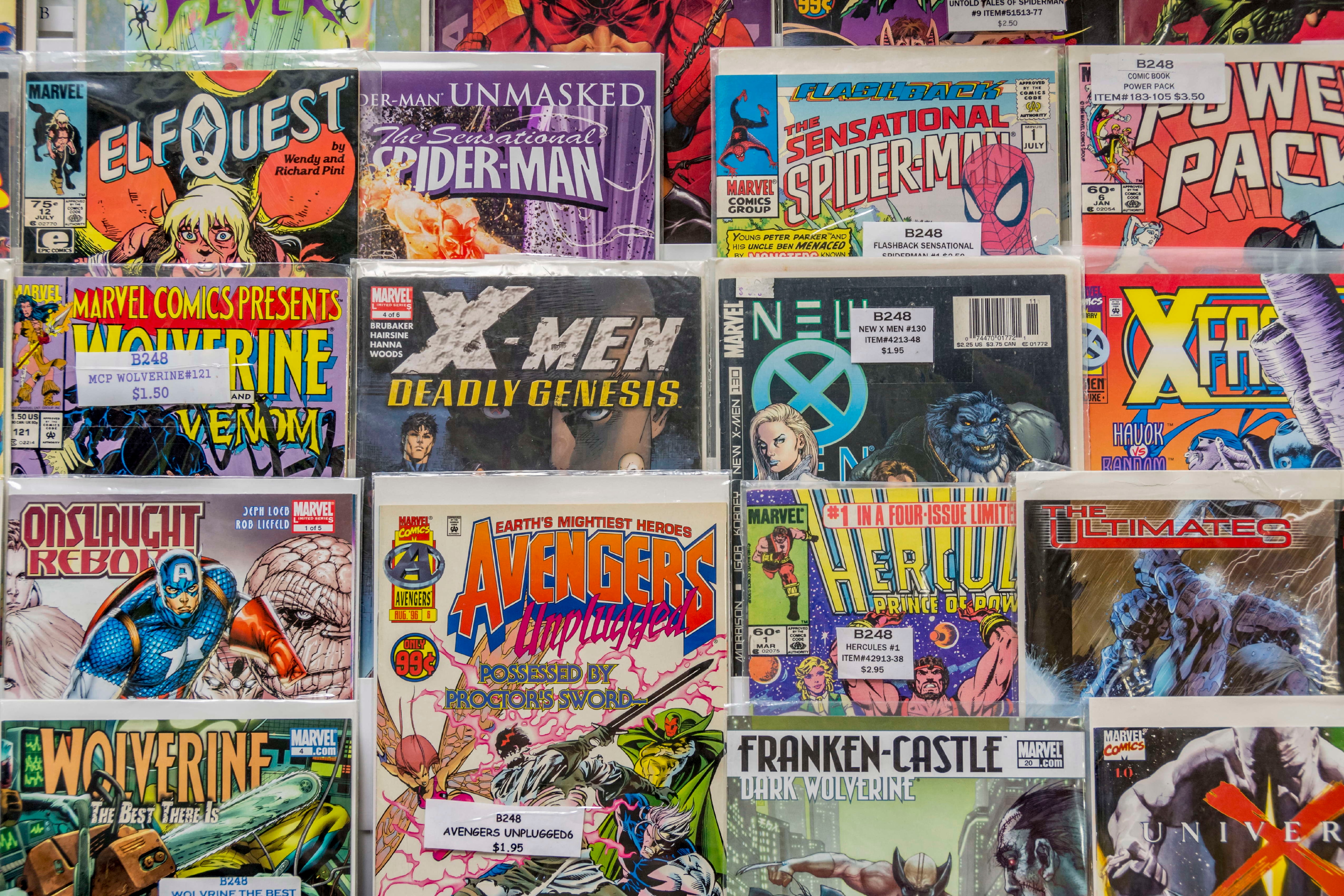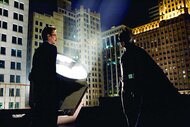Create a free profile to get unlimited access to exclusive videos, sweepstakes, and more!
Comic-Con@Home: Comic creators raise voices for better representation: 'Bring in the right people. Advocate for that'

When it comes to matters of diversity and inclusion in the pop culture space — be it television, film, or even comics — one issue keeps coming up: Should preexisting characters be reimagined as a different gender or race, or is it simply better for creatives to work on developing new characters that can better represent these different experiences?
Well, today, Comic-Con@Home featured three separate panels discussing as much: the API & AAPI Creators: The Original Comics Pioneers! panel; the Native Americans in Pop Culture with Taboo (from the Black Eyed Peas) panel; and the Afrofuturism, Funk, and the Black Imagination panel.
In the panel focusing on API and AAPI creators, writer Ram V (Blue in Green, Venom) notes that characters are not real, and while they might affect society and culture, they're still "malleable" and subject to change depending on who's writing them, as different comic runs can see different writers at the helm.
"The artist drawing them hasn’t drawn them [as] a different sex or [race], but they’re fundamentally changed if two different people are writing it," he states. "So my question is why can’t that expand to the way they look? Because the way you are on the inside is one facet, and the way you look is also an important facet of those characters. There is absolutely no reason why a character can’t be portrayed a different way, [as] a different sex [or] cultural heritage — as long as you write it well."
Check out the API & AAPI Creators: The Original Comics Pioneers! panel here.
Ram V continues, "The problem comes in when you don’t understand why you’re doing this and why you’re changing these characters... What is the point of representing Captain America as a Black female? What are you going to do with it? Rather than saying we shouldn’t do this, my endeavor would be to say we should absolutely do this, and we should push to make that experience feel authentic, and celebrate that change."
TV executive-turned-comic-writer Pornsak Pichetshote (The Good Asian, Infidel) agrees with this, though he does have a slight caveat. "I've always been pro 'Let's make new things,' so there's one less filter to talk about the world we're in through the story," he says. "There's less potential things to stumble upon and more avenues to go [down] when you're working on things specifically tailored to the moment you're living in."
However, Pichetshote does note that the comic industry, in particular, loves to take older titles and make them relevant again — something other industries are following suit with, especially as evidenced by this current spate of reboots and revivals. "If you're going to be in the business of making old things new again, embrace the specificity of different characters, backgrounds, and ethnicities, [it] opens these characters up and allows you to interrogate them in new and novel ways that make them more relevant to contemporary society."

Comic writer Jeremy Holt (Made in Korea) agrees with Pichetshote, noting that when writing a character that is outside your own experience, be it in regards to gender, race, or even sexuality, it must be handled with care, as it is a sensitive topic. "If you haven’t lived that experience you really do need to do your research," says Holt. "You can’t just swap in a [character of color] to make your story more interesting. That’s a cop-out and it’s taking up space from people who haven’t been given that space to begin with."
Pichetshote also stresses the importance of research, saying that no one is actually stopping anyone from creating the work they want to see, but that audiences do notice when things are handled insensitively. "Writers can write whatever they want, but they have to realize they live in an ecosystem where they will be written back to, where the voices they’re writing about will respond and they have to be able to live with the consequences of that response."
All three creators state the importance of actually speaking to people whose experiences align with the identities you might be trying to write, as there are some aspects of a person's life that can only be understood by speaking to them.
Check out the Native Americans in Pop Culture with Taboo panel here:
During his Comic-Con@Home panel on Native Americans in Pop Culture, Black Eyed Peas member and comic book writer Taboo (Marvel's Werewolf By Night) also touched on the importance of listening to people whose experiences you're trying to capture, underscoring the need for allies to also do the work during the creative process.
"Bring in the right people. Advocate for that," he says, before touching on how this applies to Native American characters in particular. "A lot of times, the representation of the actual characters is so over-stereotyped and misleading to a modern-day Native who understands that there’s going to be these visual stereotypes that are going to be around for a long time. But in actuality, there [are] also cultural consultants you can bring aboard when it comes to comics, television, and film, that can give you an authentic genuine representation and gives you a voice that speaks to a modern day kid, but is inclusive of everyone."
He goes on to add, "At the end of the day, I want people who may not know about the Indigenous perspective to also rock with us. I want them to be informed and to really feel like it’s a part of them. Just like when I watched Black Panther. I’m not African American or African, but it really resonated with me as a hero without a cape. Whatever Wakanda embodied, and however they celebrated the beauty of the culture, I wanted to do that for Native people, for Latinos. The same thing with Asians and Filipinos and Middle Eastern people, and all the beauty that is a mosaic of cultures."
Check out the Afrofuturism, Funk, and the Black Imagination panel here:
Of course, part of what makes Black Panther such an iconic comic book title is its use of Afrofuturism, imagining a world where the fictional African country of Wakanda was never colonized, allowing its people to go on to develop all sorts of sophisticated technology that is light-years ahead of other countries. This is what allows the nation to remain hidden from the rest of the world, as they choose not to engage with it.
Author Ytasha Womack (Afrofuturism: The World Black Sci-Fi and Fantasy Culture) touches on this in the Comic-Con@Home panel on Afrofuturism, Funk, and the Black Imagination. She defines Afrofuturism as a way of looking at the future or alternate realities specifically through a Black cultural lens — one that includes people of African descent from all over the world.
"[Afrofuturism] really celebrates the imagination and the role of imagination in culture. It’s a reminder for people that different cultures have a relationship to space and time," explains Womack, who considers Afrofuturism to be an aesthetic, a method, and a practice. "It’s also a reminder of the contributions that people of the continent and of African descent made to our understanding of space and time, and how it’s expressed in the culture. It’s also an affirmation of being able to create and imagine these futures and to tell stories about these futures and to do so in a way where you’re very much engaging the past as well."
Womack feels that the power of Afrofuturism lies in its ability to expose the limitations people place on their own imaginations as they contemplate what their worlds could look like — something that speaks to marginalized creators, who are sometimes trying to decolonize their own work, or imagine one without the typical patriarchal constraints encountered in the real world.
"Sometimes you don’t know what you haven’t been thinking about," says Womack. "For many people, it’s a missing part of a whole."
And for anyone who might hesitate about possibly going against typical depictions of classic characters, Ram V, Pichetshote, and Holt all agree that the focus should be on teaching people to not only "see color" but to also be enthused and excited by it.
"We’ve kind of trained ourselves to put characters and mythologies and stories into these compartmentalized boxes and we can say that we can’t change them because it’s religion, fandom, canon, continuity," Ram V says. "Toss all that aside. Just tell good stories and you’ll find people entertained and excited by them."
Click here for SYFY WIRE's full coverage of Comic-Con@Home 2021.














